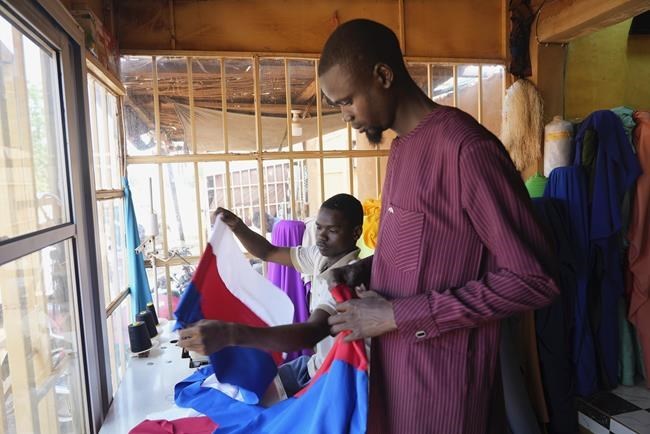ABUJA, Nigeria (AP) — Niger’s junta authorized troops from neighboring Mali and Burkina Faso to come to its defense and asked the French ambassador to leave the country Friday, raising the stakes in a standoff with other West African nations who are threatening force to reinstate Niger’s democratically elected president.
The junta leader, Brig. Gen. Abdrahmane Tchiani, signed two executive orders authorizing the "security forces of Burkina Faso and Mali to intervene on Niger territory in the event of aggression,” senior junta official Oumarou Ibrahim Sidi said late Thursday, after hosting a delegation from the two countries in the Nigerien capital, Niamey.
Sidi did not provide further details about the military support from the two countries whose military regimes have said any use of force by the West African bloc ECOWAS against Niger's junta would be treated as an act of war against their own nations.
The Nigerien Ministry of Foreign Affairs said French Ambassador Sylvain Itte was asked to leave Niger within 48 hours in a letter that accused him of ignoring an invitation for a meeting with the ministry.
The letter dated Friday, a copy of which was seen by The Associated Press, also cited “actions of the French government contrary to the interests of Niger.”
France has consistently acknowledged only the authority of Niger’s elected President Mohamed Bazoum, still detained by the junta. Paris reiterated Friday night that “only legitimate elected Nigerien authorities” have a say about the fate of its ambassador.
The invitation of troops from Mali and Burkina Faso as well as the expulsion of the French ambassador show “a very strong alignment” between the regimes of the two countries and that of Niger "in terms of having a very strong anti-Western and pro-authoritarian orientation," said Nate Allen, an associate professor at the Africa Center for Strategic Studies.
Before last month's ouster of Bazoum, Niger, a former French colony, was seen as the West's last major partner against jihadi violence in the Sahel region below the Sahara Desert, which is rife with anti-French sentiment.
The French Embassy in Niger’s capital, Niamey, was attacked in the early days of the July 26 coup. The military leaders of the coup have requested help from private Russian military company Wagner to stem extremist attacks.
The status of the request following the death of Wagner founder Yevgeny Prigozhin in a plane crash this week is unknown. ECOWAS said on Friday that along with the African Union, it “stands against the use of private military contractors.”
The junta's agreement with Mali and Burkina Faso was the latest of several actions taken by Niger's mutinous soldiers to defy sanctions and consolidate a junta they have said would rule for up to three years, further escalating the crisis after last month's coup in the country of more than 25 million people.
The ECOWAS Commission president, Omar Alieu Touray, said Friday that the bloc's threat to use force to reinstate Bazoum was "still on the table,” rejecting the junta's three-year transition plan.
Eleven of the bloc's 15 countries, not including the military-ruled countries of Mali, Burkina Faso, Guinea and Niger itself, have expressed commitments to deploy troops to restore democracy in Niger once a decision is made to intervene.
The bloc would in the meantime continue to explore diplomatic options to reverse the coup, Touray told reporters in Nigeria’s capital city of Abuja.
The latest of such diplomatic efforts came Thursday when Nigerian President Bola Tinubu, who is the chairman of the regional bloc, sent a delegation of Islamic leaders to speak with the junta.
Touray said the West African heads of state would decide on when to use force whenever it feels like all diplomatic means have failed.
“ECOWAS cannot just fold its hands,” he asserted.
Details of what has been called the ECOWAS “standby” force have not be released. Regional officials have suggested any military intervention would be like the force deployed in Gambia in 2017 to force Yahya Jammeh out of power as president after he refused to concede an election loss.
The junta has been exploiting grievances among the population toward Niger’s former colonial ruler, France. It also has accused Bazoum’s government of failing to do enough to protect the country from Islamic extremists, and has asked the Russian mercenary group Wagner for help.
On Friday, Niger also faced new sanctions when the U.S. Millennium Challenge Corporation — which has signed $750 million in grant programs with the country since 2008 — suspended operations that focused on improving agriculture, women's literacy and roads in Niger. The coup was “contrary to the principles of democratic governance,” the U.S. agency said.
ECOWAS already has joined Western and European countries in imposing sanctions against Niger, including cutting the supply of its electricity from Nigeria and the closure of borders with the countries' neighbors.
Touray acknowledged Friday that those sanctions have resulted in “serious socio-economic crises” in Niger, but said the sanctions were “for the interest of the people of Niger.”
___
Associated Press journalist Baba Ahmed in Bamako, Mali, and Elaine Ganley in Paris, France contributed to this report.
Chinedu Asadu, The Associated Press



